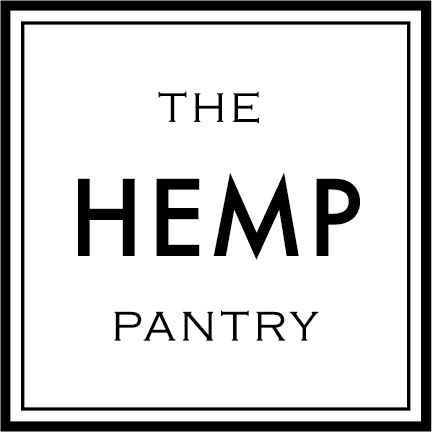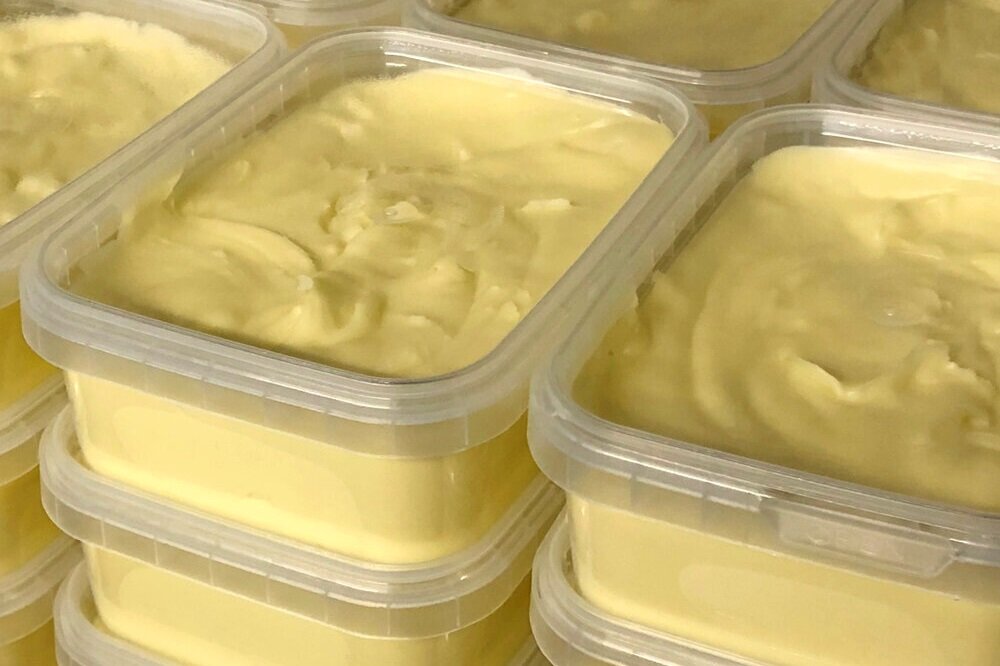Veurre® is a Vegan Margarine… That’s a Good Thing!
Our organic, 100% natural, allergen-free and palm oil-free vegan butter alternative Veurre® is legally classified as a margarine.
For many, the word ‘margarine’ still has a negative connotation, originally being full of unnatural additives and palm oil. However, for us, Veurre® being classed as a margarine is a great thing! And here’s why…
What is Margarine?
Butter is a dairy product made from milk. Margarine is a butter substitute made from combining vegetable oils with water, and other ingredients, such as salt or flavourings. A butter substitute is classed as a margarine when it has a similar fat content to dairy butter, at around 80-81%.
Margarines are made from vegetable oils such as olive, rapeseed or soya and plant-based ingredients, and are usually dairy-free and vegan.
However, not all are, so it’s important to check the ingredients list and look at the packaging to ensure it is vegan. Some margarines include ingredients derived from animals such as whey, casein or lactose. Margarine was first made using animal fat, and, although rare, some still contain this ingredient – see more below on the history of margarine.
Why is Margarine So Good for Baking?
Margarine is a well-known substitute for butter in baking.
This is because margarine has a similar fat content to butter of around 80-81% and so acts in a similar way when used in cakes, bakes and pastries.
It’s often used in vegan and dairy-free baking and cooking as a direct replacement for butter.
What is the Difference Between a Margarine and a Spread?
Butter substitutes can also be called spreads. Spreads are different to margarines as they contain 79% or less fat content, and often more water content.
Often spreads are used for spreading on bread or toast, but aren’t so good to bake or cook with due to the higher water content and lower fat content.
As Veurre® has a fat content of 81%, its classed as a vegan margarine, and not as a spread. This is why it is excellent for baking! (And why it makes amazing vegan croissants). It can also be used as a spread and can be melted too, for example on a baked potato.
When Was Margarine First Developed?
Margarine is over 150 years old – a fairly recent development compared to butter – and has an interesting history.
It was first created in France in 1869 when Emperor Napoleon III challenged the scientists of the day to come up with an alternative to dairy butter. This alternative needed to be cheaper to produce than dairy butter, and suitable for the armed forces and lower classes.
The French chemist Hippolyte Mège-Mouriès stepped up to the challenge and invented oleomargarine, soon shortened to margarine. The original recipe used beef tallow, milk and margaric acid (a saturated fatty acid). Early manufacturers also added a dye to the white substance, to make it look more like yellow dairy butter.
In 1871, margarine began to be made with vegetable oil – specifically cottonseed oil – along with animal fat. However, in the early 1900s as animal fat and butter became more expensive, scientists invented hydrogenation which converted vegetable oils into more solid substances at room temperature.
There was a drop in butter production during the great depression in the 1930s and the first and second World Wars, and margarine was produced on an industrial scale. The ‘original’ margarine, made with animal fat, almost completely disappeared from the market. Meanwhile, margarine made with hydrogenated vegetable oils, and including flavourings to make it taste more like butter, became widespread.
The anti-saturated fat campaigns from the 1950s through to the 1980s increased the popularity of margarine as butter contained saturated fats, considered at the time to be extremely unhealthy.
However, in the 1990s, studies on trans fats, found in hydrogenated oils, showed their harmful effects to health and margarine using hydrogenated oils fell out of fashion.
Since then, the majority of modern margarines no longer contain hydrogenated oils or trans fats.
Why Does Margarine Have Such A Negative Connotation?
Margarine has undergone an interesting evolution in a relatively short space of time and there are many who still remember the revelations about the harmful effects of trans fats found in older margarines using hydrogenated oils.
Many margarines also had artificial ingredients added, such as colouring and emulsifiers, to make them taste, look and spread just like butter. And these additives are now considered unhealthy.
Often margarines contain palm oil, and in recent years the intensive production of palm oil has been linked to environmental issues including deforestation.
A further issue for many, is that many margarines are often made from genetically engineered crops such as soya, canola or corn.
However, times have changed and our modern-day vegan margarine, Veurre®, is made from 100% natural and organic ingredients.
What are the Natural Ingredients in Veurre®?
The Hemp Pantry’s Veurre® is made from 100% natural, organic ingredients:
Virgin Coconut Oil
Extra Virgin Olive Oil
Cacao Butter
Rosemary Extract
And Filtered Water (not considered organic as does not contain carbon)
Veurre® has:
No palm oil
No hydrogenated oils
No trans fats
No artificial preservatives or colours
No GMO
No added salt or sugar
Veurre® is allergen free – it contains none of the 14 major allergens and so is dairy-free, soya-free, nut-free and gluten-free.
It is minimally processed with a delicious natural flavour of mild coconut, olive and earthy hemp. The natural texture is as smooth as butter, and is a creamy light-yellow colour. Veurre® has a firm consistency out of the fridge and softens at room temperature, in the same way as butter.
The taste, texture and colour are completely natural – we do not add any flavouring, additives or colouring. We love Veurre® just as it is!
Modern-Day Margarine
Margarine has evolved since its early days, and – as Veurre® proves – margarine in the 21st century can be natural and minimally processed, using high-quality vegetable oils.
Our plant-based margarine is excellent for baking and cooking, due to it’s 81% fat content, as well as being great for spreading thanks to its consistency that naturally melts when out of the fridge (just like butter).
And, as our tastes evolve, we no longer want butter substitutes to have the same taste as butter (which can only be achieved with artificial flavourings) but to enjoy the unique mild flavour of a natural product like Veurre®.
Read more about the versatility of Veurre® or check out our recipes for delicious cakes, bakes and desserts using our plant-based, natural margarine. You can buy Veurre® from our online shop.

